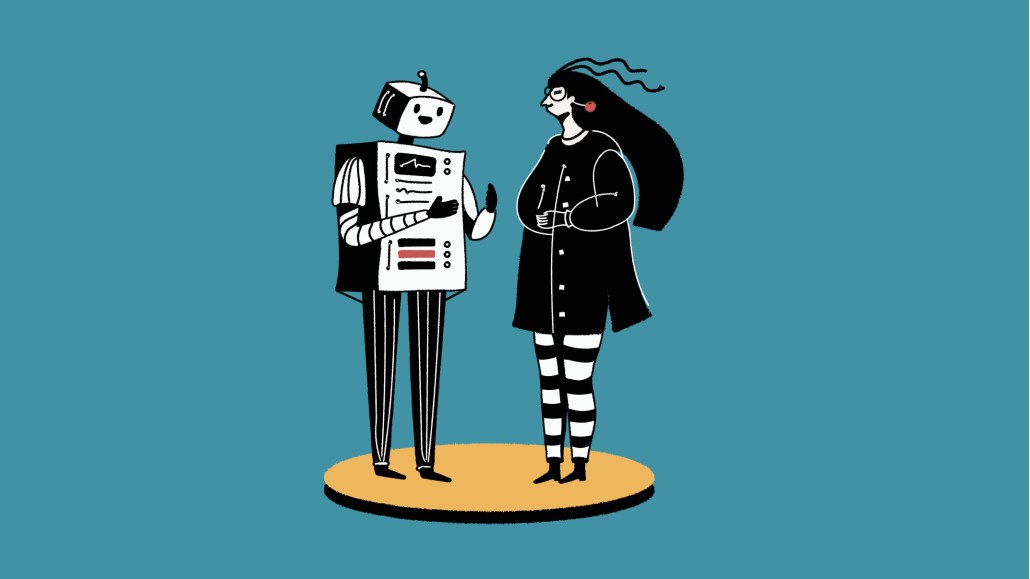Secure your place at the Digiday Media Buying Summit in Nashville, March 2-4
Why BDG editor Charlotte Owen thinks AI is good for editorial strategy

This article is part of Digiday’s coverage of its Digiday Publishing Summit. More from the series →
BDG isn’t using artificial intelligence to generate content. But the rise of the technology in the media ecosystem is reshaping BDG’s editorial strategy, Charlotte Owen, editor in chief of Bustle and Elite Daily at Bustle Digital Group, explained onstage on Monday at the Digiday Publishing Summit in Key Biscayne, Fla.
“AI has given all publishers a gift because it’s really given us a north star of where we shouldn’t be,” Owen said. “We have to un-romanticize the way we talk about AI.”
The lifestyle publisher is doubling down on pushing out fewer stories that are focused on original reporting and personal essays to differentiate its articles from SEO-driven content that could be replicated by generative AI technology, Owen said. “I don’t think there’s a place for a robot in a conversation between two moms,” she said, as an example. And if one of her writers is writing a story that could’ve been written by generative AI, “they’re writing the wrong story,” she said.
This strategy has led to traffic increases (she did not share how much) on original reported pieces, such as recent digital cover stories featuring celebrities like actress Rachel McAdams, Owen said.
“We think about what we can be doing that AI can’t,” she said. “But that doesn’t mean we’re shoving our head in the sand.”
Owen’s team is using AI for some tasks, such as writing emails (especially to help word the more sensitive ones sent by managers — instead of a manger saying an employee did a “bad” job they can use a generative chatbot to find alternatives like “sub-optimal,” Owen joked), automating story tags for content alignment with advertising and for research and interview questions, she said.
“We are mainly thinking about how it can just speed up internal processes at this point,” Owen said. Her teams aren’t working on any consumer-facing AI products yet.
But BDG’s sales team is using AI technology to make money, and is projecting to bring in over seven figures of revenue in deals that involve generative AI by the end of this year, Owen said. BDG recently sold a sponsorship for a generative AI product called a “lunch bot” that suggested different types of sandwiches for lunch.
Owen is working with smaller teams than in years past, and AI tools can help fill in for jobs that no longer exist, such as assistant entry-level jobs helping editors with administrative tasks and support editorial functions, she said. BDG has gone through four rounds of layoffs in the last year, and transitioned away from a part-time writer model to focus on their full-time writers.
But Owen said the way her teams are producing content now reminds her of her time working in magazines, publishing a few well-reported stories a month. “We’re not trying to shove up as many stories a day as we can. It’s really about the [brand] authority. It’s about creating brand loyalty with our readers,” Owen said. “I’m much more excited to get out of bed in the morning and work on stories like that than 10 search terms around the best workout for biceps.”
So does Owen think generative AI will take writers’ jobs?
“I bloody well hope not,” she said.
More in Media

Media Briefing: Turning scraped content into paid assets — Amazon and Microsoft build AI marketplaces
Amazon plans an AI content marketplace to join Microsoft’s efforts and pay publishers — but it relies on AI com stop scraping for free.

Overheard at the Digiday AI Marketing Strategies event
Marketers, brands, and tech companies chat in-person at Digiday’s AI Marketing Strategies event about internal friction, how best to use AI tools, and more.

Digiday+ Research: Dow Jones, Business Insider and other publishers on AI-driven search
This report explores how publishers are navigating search as AI reshapes how people access information and how publishers monetize content.







